5th Annual Conference Nice - European-microfinance.org
5th Annual Conference Nice - European-microfinance.org
5th Annual Conference Nice - European-microfinance.org
You also want an ePaper? Increase the reach of your titles
YUMPU automatically turns print PDFs into web optimized ePapers that Google loves.
6<br />
5 th <strong>Annual</strong> <strong>Conference</strong> <strong>Nice</strong><br />
those created by women. They show that, compared to men, women start their own business<br />
with less financial capital, less experience and less resources in terms of human and social<br />
capital. This causes many women to set up under-funded businesses, which can have a<br />
negative impact on their long term performance. Thus the men/women differences are felt<br />
both on the structure (size of the firm, business sector) and on the profits. The performance<br />
outcomes (profitability, durability) 2 of firms managed by women are generally lower. But the<br />
impact of gender on economic performance has led to a great deal of controversy. Today<br />
however, a consensus seems to arise on the fact that if a number of variables can be<br />
controlled (business sector, starting resources, age of business), men and women’s<br />
performances will be similar (Watson 2002, Johnsen and McMahon 2005).<br />
The most important research work has focused on the issue of gender and finance<br />
(Anderson, Carter, and Shaw, 2001). Women experience more difficulties than men to raise<br />
start-up and recurrent finance. Whatever the sector or area, women start their business with<br />
about half the capital that is used by men (Brush, 1992). Moreover in surveys, women<br />
generally declare that they are or have been discriminated against by banks. The general<br />
feeling is that banks are reluctant to give them credit. There are three main types of<br />
explanations put forward for this.<br />
According to certain authors, women are discriminated against in terms of credit<br />
supply not because of their sex, but because of the less favourable characteristics of their<br />
project. Coleman and Carsky (1996) argue that businesses managed by women are less<br />
attractive for banks because they are small and considered to be more risky. Banks prefer<br />
financing larger projects that are already established which favours men. Riding and Swift<br />
(1990) compared the experience of men and women entrepreneurs in their relationship with<br />
financial institutions over a given period. They show that the financial conditions are less<br />
favourable to women, but that businesses managed by women are both younger and smaller<br />
than those managed by men, and have a weaker economic growth. Banking conditions would<br />
therefore be the result of rational banking behaviour when faced with riskier projects. It<br />
seems women also experience greater difficulty in offering guarantees. As they are more<br />
likely to be working part-time or to earn less than men, women find it more difficult to<br />
accumulate personal savings (Marlow and Patton, 2005). Thus for both these reasons, lack of<br />
personal funds puts them at a disadvantage when creating their business. Their personal<br />
contribution is limited and such a small capital cannot be used as collateral to strengthen the<br />
loan relationship. Work experience before starting a business is therefore crucial to<br />
accumulate financial capital, but also human capital and to build up a network. Whereas<br />
Fabowale and alii (1995) for Canada or Coleman (2000) for the United States demonstrate<br />
that when the firms’ characteristics are taken into account (age and size) women have equal<br />
access to credit, other studies found that structural dissimilarities cannot account for all the<br />
gender differences in financing patterns (see Carter and Shaw 2006 for a survey).<br />
Other authors focused on demand size risk and debt aversion (Bird and Brush, 2002).<br />
It seems women are less encouraged to start businesses with high growth rates that require<br />
important investments (financial and human) and prefer to avoid debt, which would explain<br />
why they do not apply for bank credits so much. Women start their business to ensure their<br />
own employment rather than to develop it. For Danes and alii (2007), because they give<br />
priorities to their families and because they are in charge of educating their children, they opt<br />
for smaller <strong>org</strong>anisation structures that are easier to manage. The 2006 Global<br />
entrepreneurship monitor survey (cf. Allen and alii, 2007) shows that fewer women than<br />
men believe they have the skills to start their own business. Women also have less selfconfidence.<br />
Whatever their reason for starting a business, they consider themselves and the<br />
entrepreneurial environment less favourably than men, which is a key point when explaining<br />
the smaller number of women in this area (Langowitz and Minniti, 2007). They are more risk<br />
averse than men (Watson et Robinson, 2003), which leads them to ask for smaller loans.<br />
2 In France, the durability rate for three year old firms is 70.4% for firms created by men and 67.7% for firms created<br />
by women.



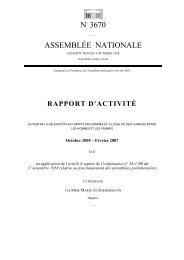
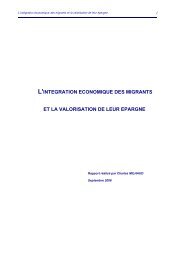

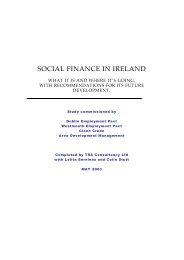

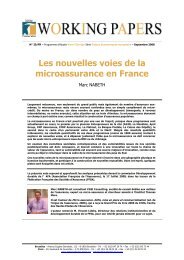

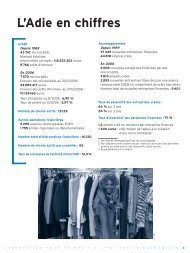
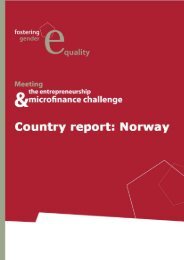


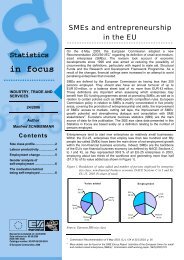
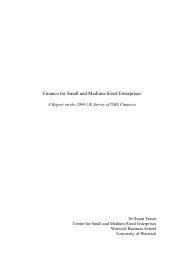
![Joint Report on Social Protection and Social Inclusion [2005]](https://img.yumpu.com/19580638/1/190x132/joint-report-on-social-protection-and-social-inclusion-2005.jpg?quality=85)
